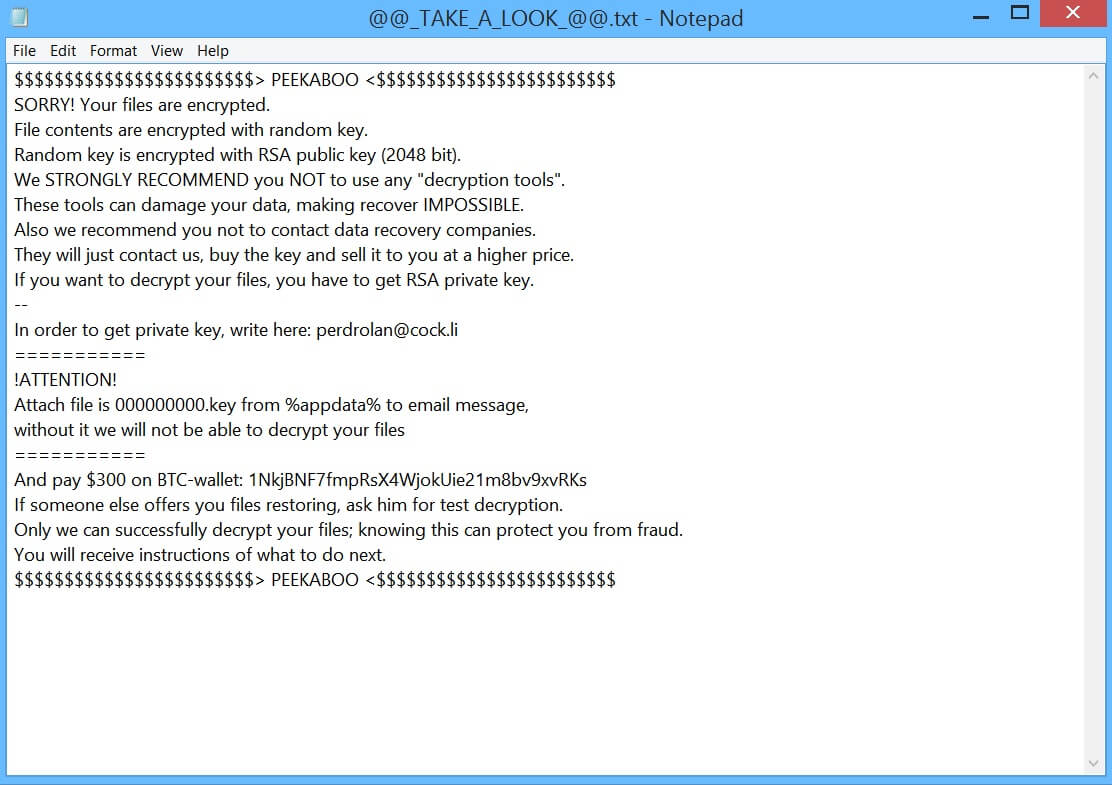What is .peekaboo files virus? .peekaboo files virus is also known as Peekaboo ransomware which encrypts files and demands a ransom.
Peekaboo or otherwise known as .peekaboo files virus is ransomware. It encrypts files by appending the .peekaboo extension to them, making them inaccessible. All encrypted files will receive the new extension as a secondary one. Another extension will be added before it that is generated on a random principle. The Peekaboo ransomware drops a ransom note, which gives instructions to victims on how they can allegedly restore their data.

Threat Summary
| Name | .peekaboo Files Virus |
| Type | Ransomware, Cryptovirus |
| Short Description | The ransomware encrypts files on your computer system and demands a ransom to be paid to allegedly recover them. |
| Symptoms | The Peekaboo ransomware will encrypt your files by appending the .peekaboo extension to them, along with a unique identification number placing the new .peekaboo extension as a secondary. |
| Distribution Method | Spam Emails, Email Attachments |
| Detection Tool |
See If Your System Has Been Affected by malware
Download
Malware Removal Tool
|
User Experience | Join Our Forum to Discuss .peekaboo Files Virus. |
| Data Recovery Tool | Windows Data Recovery by Stellar Notice! This product scans your drive sectors to recover lost files and it may not recover 100% of the encrypted files, but only few of them, depending on the situation and whether or not you have reformatted your drive. |

.peekaboo Files Virus – Decryptor Released (Update June 2019)

.peekaboo Files Virus – How Did It Infect My PC and What Happened? (Update June 2019)
.peekaboo Files Virus might spread its infection via a payload dropper, which initiates the malicious script for this ransomware. The virus might also distribute its payload file on social media and file-sharing services. Freeware which is found on the Web can be presented as helpful also be hiding the malicious script for the cryptovirus. Read the tips for ransomware prevention from our forum.
Peekaboo or better known as the .peekaboo Files Virus is ransomware that encrypts your files and shows ransomware instructions inside a ransom note called @@_TAKE_A_LOOK_@@.txt:
Beside the instructions you can see in the above image, there is a note that states the following:
$$$$$$$$$$$$$$$$$$$$$$$$> PEEKABOO <$$$$$$$$$$$$$$$$$$$$$$$$ SORRY! Your files are encrypted. File contents are encrypted with random key. Random key is encrypted with RSA public key (2048 bit). We STRONGLY RECOMMEND you NOT to use any "decryption tools". These tools can damage your data, making recover IMPOSSIBLE. Also we recommend you not to contact data recovery companies. They will just contact us, buy the key and sell it to you at a higher price. If you want to decrypt your files, you have to get RSA private key. -- In order to get private key, write here: perdrolan@cock.li =========== !ATTENTION! Attach file is 000000000.key from %appdata% to email message, without it we will not be able to decrypt your files =========== And pay $300 on BTC-wallet: 1NkjBNF7fmpRsX4WjokUie21m8bv9xvRKs If someone else offers you files restoring, ask him for test decryption. Only we can successfully decrypt your files; knowing this can protect you from fraud. You will receive instructions of what to do next. $$$$$$$$$$$$$$$$$$$$$$$$> PEEKABOO <$$$$$$$$$$$$$$$$$$$$$$$$
You should NOT under any circumstances pay any ransom sum.
The extortionists want you to pay a ransom for the alleged restoration of your files, same as with a lot of ransomware viruses. .peekaboo Files Virus ransomware could make entries in the Windows Registry to achieve persistence, and could launch or repress processes in a Windows system. All encrypted will receive the .peekaboo extension alongside a random generated one. That extension will be placed as a secondary one to each file and look something like .peekaboo. Audio, video, image files as well as documents, backups and banking data can be encrypted by the ransomware.
The .peekaboo Files Virus could be set to erase all the Shadow Volume Copies from the Windows operating system with the help of the following command:
→vssadmin.exe delete shadows /all /Quiet
If your computer device was infected with this ransomware and your files are locked, read on through to find out how you could potentially restore your files back to normal.

Remove .peekaboo Files Virus
If your computer got infected with the .peekaboo Files Virus, you should have a bit of experience in removing malware. You should get rid of this ransomware as quickly as possible before it can have the chance to spread further and infect other computers. You should remove the ransomware and follow the step-by-step instructions guide provided below.
Preparation before removing .peekaboo Files Virus.
Before starting the actual removal process, we recommend that you do the following preparation steps.
- Make sure you have these instructions always open and in front of your eyes.
- Do a backup of all of your files, even if they could be damaged. You should back up your data with a cloud backup solution and insure your files against any type of loss, even from the most severe threats.
- Be patient as this could take a while.
- Scan for Malware
- Fix Registries
- Remove Virus Files
Step 1: Scan for .peekaboo Files Virus with SpyHunter Anti-Malware Tool
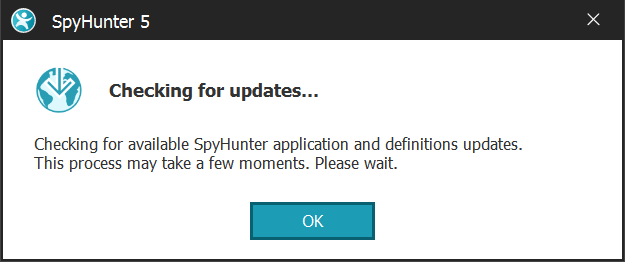
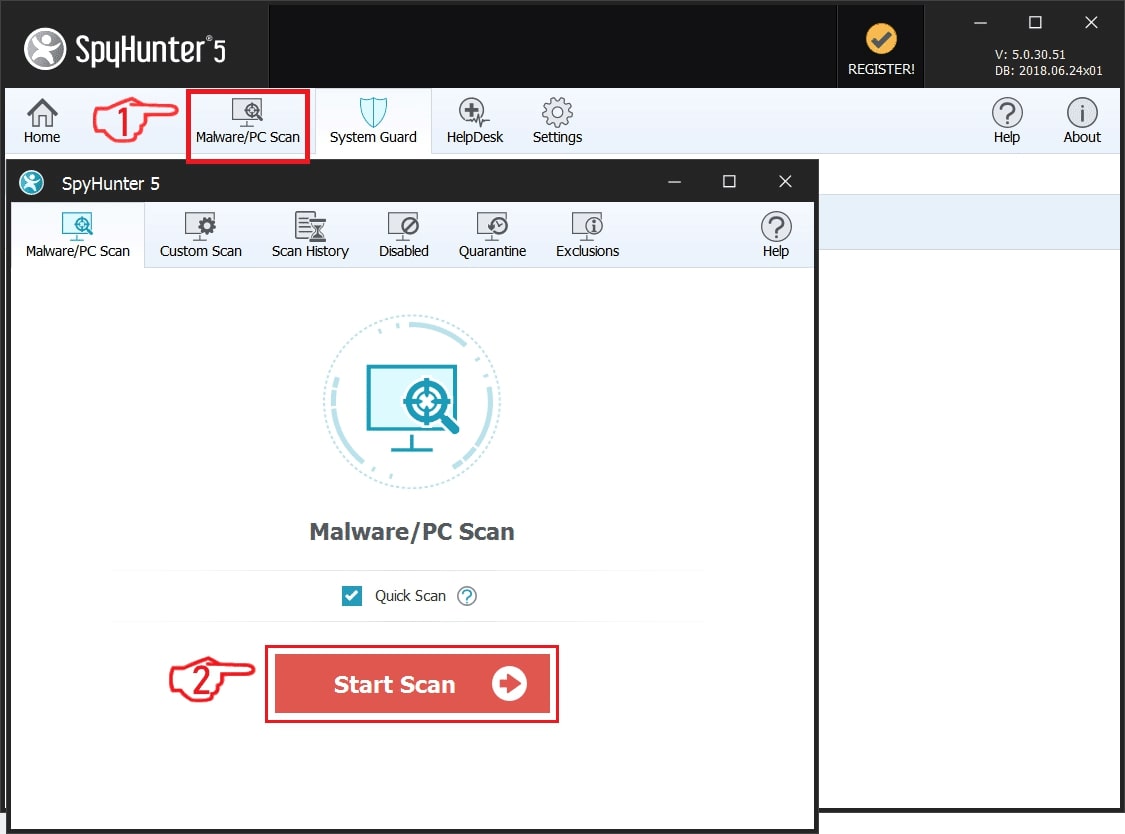
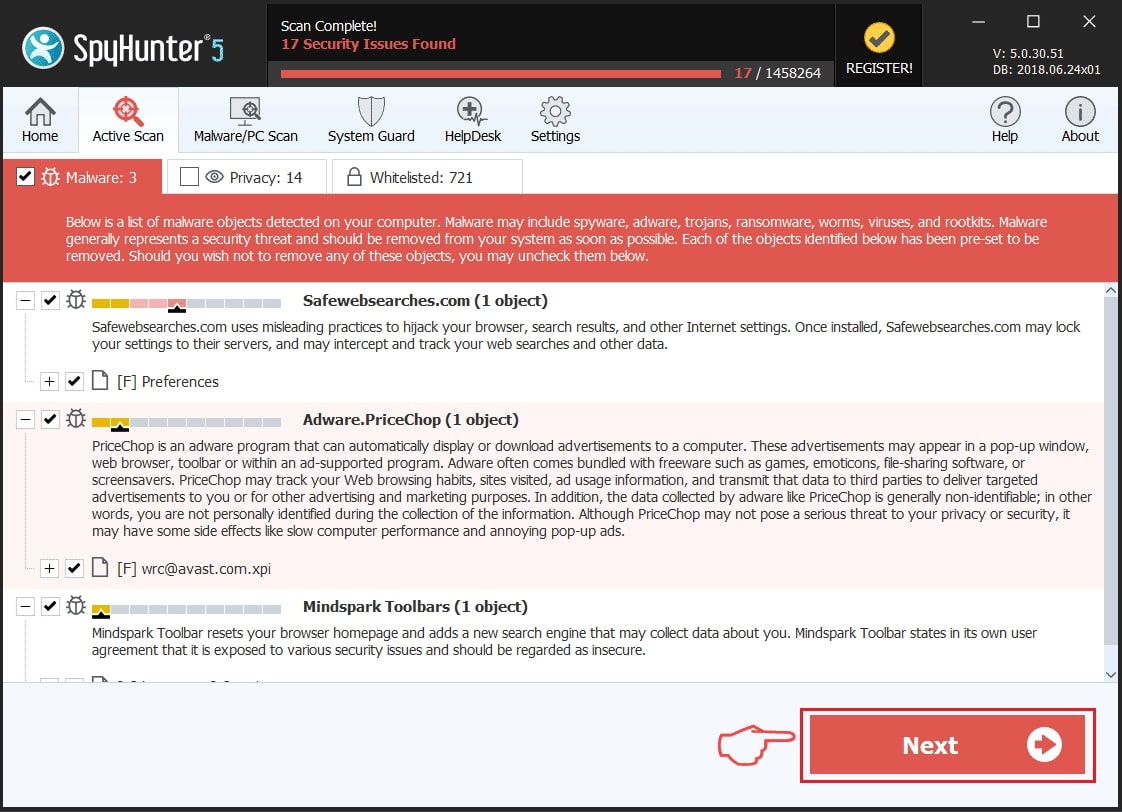
Step 2: Clean any registries, created by .peekaboo Files Virus on your computer.
The usually targeted registries of Windows machines are the following:
- HKEY_LOCAL_MACHINE\Software\Microsoft\Windows\CurrentVersion\Run
- HKEY_CURRENT_USER\Software\Microsoft\Windows\CurrentVersion\Run
- HKEY_LOCAL_MACHINE\Software\Microsoft\Windows\CurrentVersion\RunOnce
- HKEY_CURRENT_USER\Software\Microsoft\Windows\CurrentVersion\RunOnce
You can access them by opening the Windows registry editor and deleting any values, created by .peekaboo Files Virus there. This can happen by following the steps underneath:
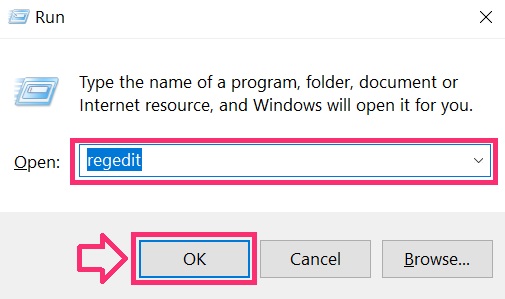

 Tip: To find a virus-created value, you can right-click on it and click "Modify" to see which file it is set to run. If this is the virus file location, remove the value.
Tip: To find a virus-created value, you can right-click on it and click "Modify" to see which file it is set to run. If this is the virus file location, remove the value.Step 3: Find virus files created by .peekaboo Files Virus on your PC.
1.For Windows 8, 8.1 and 10.
For Newer Windows Operating Systems
1: On your keyboard press + R and write explorer.exe in the Run text box and then click on the Ok button.
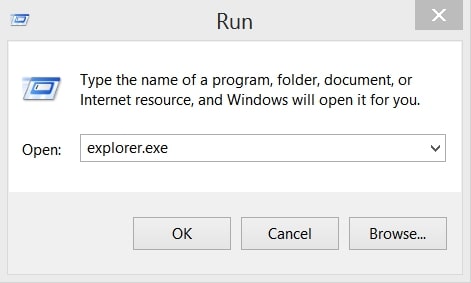
2: Click on your PC from the quick access bar. This is usually an icon with a monitor and its name is either “My Computer”, “My PC” or “This PC” or whatever you have named it.
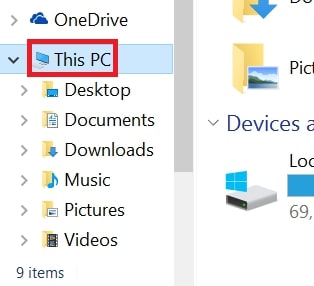
3: Navigate to the search box in the top-right of your PC's screen and type “fileextension:” and after which type the file extension. If you are looking for malicious executables, an example may be "fileextension:exe". After doing that, leave a space and type the file name you believe the malware has created. Here is how it may appear if your file has been found:
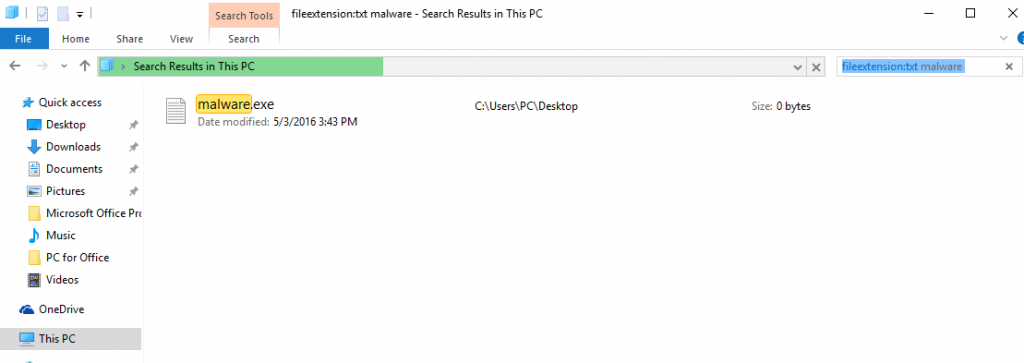
N.B. We recommend to wait for the green loading bar in the navigation box to fill up in case the PC is looking for the file and hasn't found it yet.
2.For Windows XP, Vista, and 7.
For Older Windows Operating Systems
In older Windows OS's the conventional approach should be the effective one:
1: Click on the Start Menu icon (usually on your bottom-left) and then choose the Search preference.
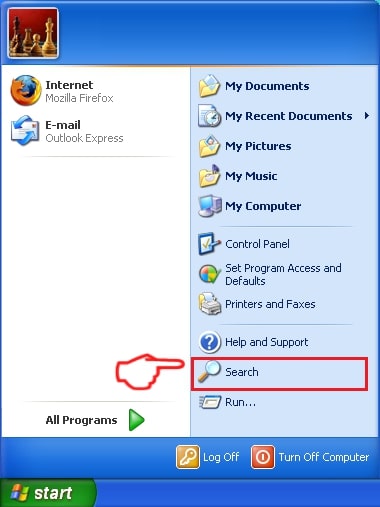
2: After the search window appears, choose More Advanced Options from the search assistant box. Another way is by clicking on All Files and Folders.
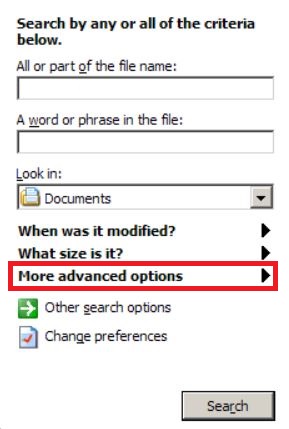
3: After that type the name of the file you are looking for and click on the Search button. This might take some time after which results will appear. If you have found the malicious file, you may copy or open its location by right-clicking on it.
Now you should be able to discover any file on Windows as long as it is on your hard drive and is not concealed via special software.
.peekaboo Files Virus FAQ
What Does .peekaboo Files Virus Trojan Do?
The .peekaboo Files Virus Trojan is a malicious computer program designed to disrupt, damage, or gain unauthorized access to a computer system. It can be used to steal sensitive data, gain control over a system, or launch other malicious activities.
Can Trojans Steal Passwords?
Yes, Trojans, like .peekaboo Files Virus, can steal passwords. These malicious programs are designed to gain access to a user's computer, spy on victims and steal sensitive information such as banking details and passwords.
Can .peekaboo Files Virus Trojan Hide Itself?
Yes, it can. A Trojan can use various techniques to mask itself, including rootkits, encryption, and obfuscation, to hide from security scanners and evade detection.
Can a Trojan be Removed by Factory Reset?
Yes, a Trojan can be removed by factory resetting your device. This is because it will restore the device to its original state, eliminating any malicious software that may have been installed. Bear in mind that there are more sophisticated Trojans that leave backdoors and reinfect even after a factory reset.
Can .peekaboo Files Virus Trojan Infect WiFi?
Yes, it is possible for a Trojan to infect WiFi networks. When a user connects to the infected network, the Trojan can spread to other connected devices and can access sensitive information on the network.
Can Trojans Be Deleted?
Yes, Trojans can be deleted. This is typically done by running a powerful anti-virus or anti-malware program that is designed to detect and remove malicious files. In some cases, manual deletion of the Trojan may also be necessary.
Can Trojans Steal Files?
Yes, Trojans can steal files if they are installed on a computer. This is done by allowing the malware author or user to gain access to the computer and then steal the files stored on it.
Which Anti-Malware Can Remove Trojans?
Anti-malware programs such as SpyHunter are capable of scanning for and removing Trojans from your computer. It is important to keep your anti-malware up to date and regularly scan your system for any malicious software.
Can Trojans Infect USB?
Yes, Trojans can infect USB devices. USB Trojans typically spread through malicious files downloaded from the internet or shared via email, allowing the hacker to gain access to a user's confidential data.
About the .peekaboo Files Virus Research
The content we publish on SensorsTechForum.com, this .peekaboo Files Virus how-to removal guide included, is the outcome of extensive research, hard work and our team’s devotion to help you remove the specific trojan problem.
How did we conduct the research on .peekaboo Files Virus?
Please note that our research is based on an independent investigation. We are in contact with independent security researchers, thanks to which we receive daily updates on the latest malware definitions, including the various types of trojans (backdoor, downloader, infostealer, ransom, etc.)
Furthermore, the research behind the .peekaboo Files Virus threat is backed with VirusTotal.
To better understand the threat posed by trojans, please refer to the following articles which provide knowledgeable details.


